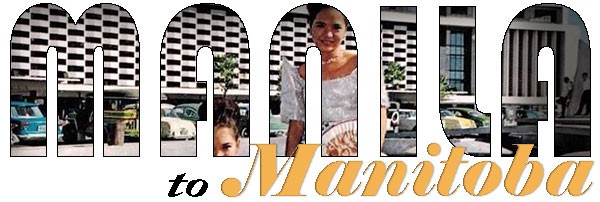Recently, I’ve been noticing a number of new street names around the city. Walking down Main Street in Winnipeg’s North End, there’s the brand new “Kelekis Honourary Way.” If you stroll down Waterfront Drive, you will see the strip of road outside the Canadian Museum for Human Rights has changed its name to “Israel Asper Way.” Now and then, our politicians like to honour a certain history or person that has made an impact on the city. Both Kelekis (owners of the iconic North End restaurant) and Mr. Asper (local media mogul) are Winnipeggers that fit the bill. But, up in the northwest corner, where “Manila Road” in the Maples and “Dr. Jose Rizal Way” in Tyndall Park are located, can we make the same argument?
Winnipeg is a sister-city to Manila. It has been since the late 1970s. The Sister City idea arose after the Second World War to promote cultural exchange and understanding. It was an international diplomatic effort to bring cities and their people together. It was some time ago when Mayors Bill Norrie and Ramon Bagatsing signed the agreement that their constituents as kin. According to Sister Cities International, the partnership comes with a few perks like humanitarian, economic, education, and arts exchanges. It is no surprise then that over the decades, a number of Winnipeg delegations have travelled to the Philippine capital (including our current mayor, Mr. Sam Katz, in 2005) to reinforce agreements in immigration, labour, relief, and investment. In 1974 Manila Road was named in honour of this relationship.
Nearby, in the Tyndall Park neighbourhood, a stretch of newly constructed homes are found on Dr. Jose Rizal Way. This street was named not too long ago in 2009 I recall the ceremony that was involved in its naming with members of the Knights of Rizal, Filipino-Canadian leaders, and local politicians there to honour the occasion. For those who do not know, Dr. Jose Rizal is the National Hero of the Philippines, a multi-talented genius who was executed by Spanish authorities in 1896. Although he denounced any revolution against Spain, his writings nevertheless incriminated him. The Philippine Revolution did result years later and the Philippines gained independence for a brief time in 1898. However, the United States came to colonize the Philippines soon after and in 1901 then Governor General William Howard Taft declared Dr. Jose Rizal the official hero of the Filipino people.
So what does the naming of Manila Road and Dr. Jose Rizal Way actually have to do with Winnipeg? Can we say all Filipino-Canadians resonate with either street name? How about all Winnipeggers? When I think of either street name, I do feel a sense of pride in knowing that there is a piece of the city that reflects the relationship Winnipeg has with its Filipino-Canadian community. Yet, at the same time, I wonder if there is equal effort happening to commemorate something that or someone who is a little less abstract. After all, not all Filipino-Canadians call Manila home or pay homage to Dr. Jose Rizal. There has to be another thing that connects us here as Canadians with Filipino heritage. Maybe it’s too early to say exactly what that name will be (I dare not propose any), but if we’re going to connect with broad relationships and idolized figures I think a street named “Pansit” or “Manny Pacquiao” would have the same effect. Winnipeggers love those Filipino icons too.
